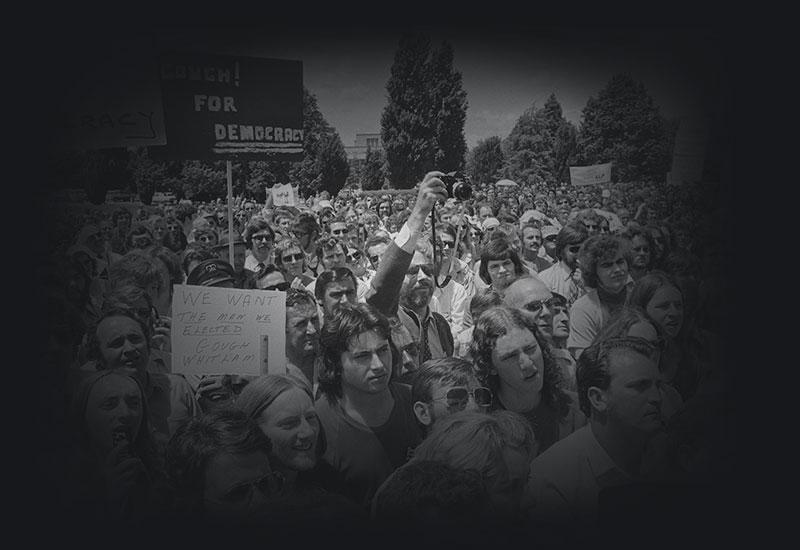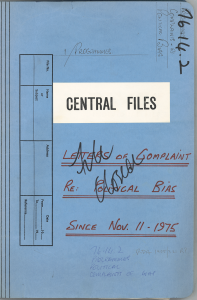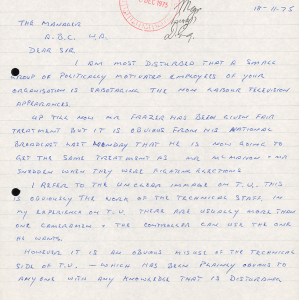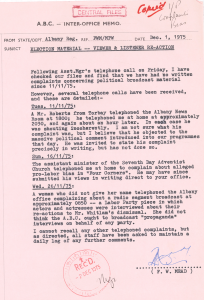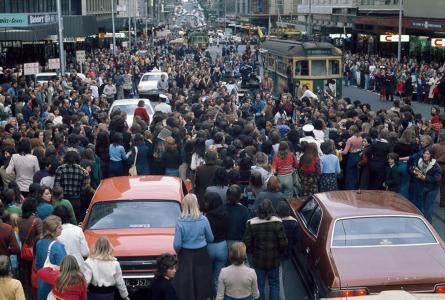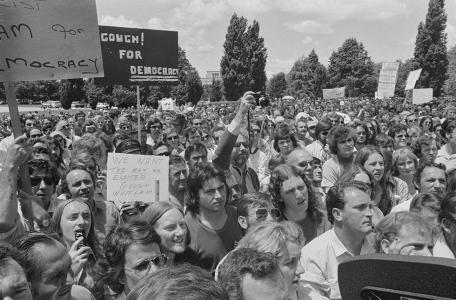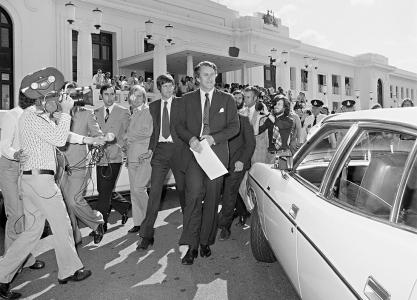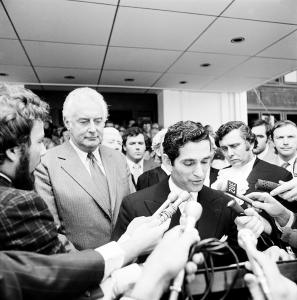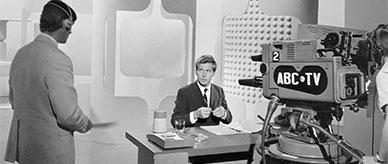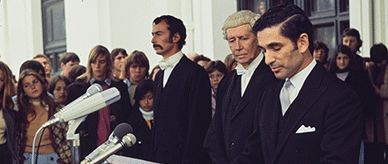The events following 11 November 1975 – ‘The Dismissal’ – were some of the most divisive and turbulent in Australia’s history. After weeks of uncertainty over the blocking of supply in the Senate by the Opposition, Prime Minister Gough Whitlam and his Labor government were dismissed by Governor-General John Kerr. Malcolm Fraser, the leader of the Opposition, was subsequently sworn in as caretaker Prime Minister.
In the wake of the stunning turn of events, Australians were divided.
Blanket media coverage
The media followed the political chaos relentlessly. Many viewers tuned in to the national broadcaster ABC for extensive coverage of the dismissal and lead-up to the subsequent December election. ABC radio and television featured live coverage of events, daily reports and interviews across its news programs such as This Day Tonight.
The Dismissal stirs arguments, even today, so it’s not surprising that the ABC received a flurry of passionate correspondence in 1975 about the political drama. An ABC file created by the Western Australian regional office and now in the National Archives (titled ‘Letters of complaint – re: political bias – since November 11 1975’) paints a vivid picture of the high emotions and strong opinions of the times.
A country torn in two
Many writers complained about what they saw as the ABC’s pro-Labor bias. One country correspondent finished their letter by commenting, ‘By the way, the ABC is fairly commonly called 'the Red Network'.’ A Ms James claimed she had the agreement of ‘130 women at a Melbourne Cup luncheon’ that the Australian Labor Party had ‘gained control of the powerful media ABC’. Mr Sharp from the southwest of the state complained about the ‘AM’ radio program: ‘The ABC should concentrate on improving the quality of their reporting and not inciting the country to riot’. Mrs Devenish of Swanbourne wrote that ‘the one sidedness of [the ABC’s] reporting is just too ridiculous for any thinking person to take seriously’. A writer who identified herself as a ‘Housewife’ suggested the pro-Labor bias was due to ‘the seemingly frantic search for sensationalism’.
Some writers took the opportunity to offer compliments to and critiques of individual journalists. One correspondent praised This Day Tonight’s Dick Tombs as ‘a delightful personality[, ] objective and courteous when interviewing’ but labelled Richard Carleton ‘rude and a bore’ who asked ‘impossible questions’. In response, the executive producer of Today Tonight (as the program was called in Western Australia) acknowledged that Carleton had been criticised more than any other reporter during the political crisis, but defended him as follows:
I think it is faireto[sic] say that he has a most difficult task and whilst I would not say he has never been at fault, I do feel that he has shown a very high degree of competence.
Not all the feedback was negative. A lecturer in political science congratulated the ABC for ‘its fine coverage of the constitutional crisis’ and, in particular, its efforts on 11 November to ‘assemble a wide range of commentators, devise probing questions and present, at such short notice, informed comment to an Australian wide audience’.
Sound and vision
Some viewers made claims that the ABC was sabotaging non-Labor appearances through poor sound or vision quality. Mr Duffy of Mount Barker wrote: ‘When one sees Mr Whitlam the angle is invariably good and the picture clear and with Mr Frazer (last Monday) the picture was fuzzy’. (Mr Fraser’s name was frequently mis-spelled, despite its frequent appearance in the headlines.)
Opinions were also shared on other programs. Mrs Ball of Cottesloe titled her note ‘A Disenchanted Viewer’ and opened with criticism of the ABC’s ‘pro-Labor’ bias, before adding that the Norman Gunston Show was ‘an insult to our mentality’ and A Big Country had ‘sadly deteriorated’. The ABC’s Western Australian manager replied diplomatically: ‘You will appreciate that your views are not necessarily those put to us by other people’.
The file includes call logs for November and December, with This Day Tonight consistently attracting many calls. 28 November was a busy day and evening on the switchboard, especially following This Day Tonight’s broadcast. Comments included: ‘Mr Whitlam a great guy’, ‘Fraser the Fraud’, ‘Protest from Morawa on behalf of self and half of Township Richard Carlton bias when interviewing Mr Fraser’, and, presciently, ‘Mr Fraser will win the election hands down’.
The final countdown
On 4 December, there were ‘numerous calls re Mr Whitlam on This Day Tonight – all complaints. Too many to list’. The next day ‘many calls for This Day Tonight’ were noted. However, the following day’s broadcasting left some viewers even more disgruntled: about 30 callers complained that the scheduled repeat of music program Countdown had been pulled.
One caller was reported to be ‘very irate’; another was especially annoyed because she had been hoping to catch her favourite pop group on the episode. Constitutional crises come and go, political allegiances can switch with the wind – but the Bay City Rollers live forever, at least in the collection of the National Archives.

